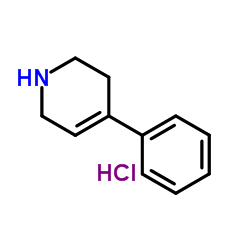

4-苯基-1,2,3,6-四氢吡啶盐酸盐结构式

|
常用名 | 4-苯基-1,2,3,6-四氢吡啶盐酸盐 | 英文名 | 4-phenyl-1,2,3,6-tetrahydropyridine hydrochloride |
|---|---|---|---|---|
| CAS号 | 43064-12-6 | 分子量 | 195.689 | |
| 密度 | N/A | 沸点 | 267.9ºC at 760 mmHg | |
| 分子式 | C11H14ClN | 熔点 | 200-204ºC | |
| MSDS | 中文版 美版 | 闪点 | 119.9ºC | |
| 符号 |


GHS06, GHS08 |
信号词 | Danger |
|
4-Phenyl-1,2,3,6-tetrahydropyridine, an excellent fragment to improve the potency of PARP-1 inhibitors.
Bioorg. Med. Chem. Lett. 15(19) , 4221-5, (2005) We have shown that a 4-phenyl-1,2,3,6-tetrahydropyridine fragment plays an important role in improving inhibitory potency against poly(ADP-ribose) polymerase-1 (PARP-1). Various benzamide analogues linked with this fragment via alkyl spacers have been prepare... |
|
|
Polygalae radix inhibits toxin-induced neuronal death in the Parkinson's disease models.
J. Ethnopharmacol. 134(2) , 414-21, (2011) Polygalae radix, the root of Polygala tenuifolia Willd, has commonly been used for the treatment of amnesia and anxiety in traditional Korean medicine. The aim of this study was to investigate its neuroprotective effects and possible mechanisms of action in m... |
|
|
Hydrogen in drinking water reduces dopaminergic neuronal loss in the 1-methyl-4-phenyl-1,2,3,6-tetrahydropyridine mouse model of Parkinson's disease.
PLoS ONE 4(9) , e7247, (2009) It has been shown that molecular hydrogen (H(2)) acts as a therapeutic antioxidant and suppresses brain injury by buffering the effects of oxidative stress. Chronic oxidative stress causes neurodegenerative diseases such as Parkinson's disease (PD). Here, we ... |
|
|
Neuroprotective effects of an herbal medicine, Yi-Gan San on MPP+/MPTP-induced cytotoxicity in vitro and in vivo.
J. Ethnopharmacol. 131(2) , 433-42, (2010) A traditional herb, Yi-Gan San, has been widely used for the management of neurodegenerative disorders in traditional East Asian Medicine.The present study investigated the neuroprotective effects of Yi-Gan San in 1-methyl-4-phenylpyridine/1-methyl-4-phenyl-1... |
|
|
Inhibition of dihydropteridine reductase by novel 1-methyl-4-phenyl-1,2,3,6-tetrahydropyridine analogs.
Science 224(4647) , 405-7, (1984) Hydroxylated derivatives of 1-methyl-4-phenyl-1,2,3,6-tetrahydropyridine (MPTP), a nigrostriatal neurotoxin in humans and primates, noncompetitively inhibited dihydropteridine reductase from human liver and rat striatal synaptosomes in vitro at micromolar con... |
|
|
4-phenylpyridine and three other analogues of 1-methyl-4-phenyl-1,2,3,6-tetrahydropyridine lack dopaminergic nigrostriatal neurotoxicity in mice and marmosets.
Neurosci. Lett. 75(1) , 65-70, (1987) C57 black mice were injected repeatedly with maximal tolerated doses of 2 chemical analogues of 1-methyl-4-phenyl-1,2,3,6-tetrahydropyridine (MPTP); 4-phenylpyridine and 4-phenyl-1,2,3,6-tetrahydropyridine. Although both compounds were clearly acutely toxic t... |
|
|
Intracerebroventricular administration of 1-methyl-4-phenyl-1,2,3,6-tetrahydropyridine (MPTP) and its metabolite 1-methyl-4-phenylpyridinium ion (MPP+) decrease dopamine and increase acetylcholine in the mouse neostriatum.
Neuropharmacology 24(6) , 585-6, (1985) We found that both MPTP and its metabolite MPP+ decrease dopamine and increase acetylcholine content of mouse neostriatum when administered intracerebroventricularly (ICV). These observations support the notion that MPP+ may be the active neurotoxin formed in... |
|
|
Cortical serotonin and norepinephrine denervation in parkinsonism: preferential loss of the beaded serotonin innervation.
Eur. J. Neurosci. 30(2) , 207-16, (2009) Parkinson's Disease (PD) is marked by prominent motor symptoms that reflect striatal dopamine insufficiency. However, non-motor symptoms, including depression, are common in PD. It has been suggested that these changes reflect pathological involvement of non-... |
|
|
Interactions of the neurotoxin MPTP and its demethylated derivative (PTP) with monoamine oxidase-B.
Neurochem. Res. 17(8) , 791-6, (1992) The kinetics of the interactions of MPTP and its N-des-methyl-derivative (PTP) have been studied. Both were mechanism-based inhibitors as well as substrates for the enzyme. Analysis of the reaction progress-curves for the formation of the corresponding dihydr... |
|
|
Protective effects of Chunghyuldan against ROS-mediated neuronal cell death in models of Parkinson's disease.
Basic Clin Pharmacol Toxicol. 107(6) , 958-64, (2010) Previous reports have suggested that the herbal medicine Chunghyuldan (CHD, Qingxue-dan in Chinese and Daio-Orengedokuto in Japanese) has wide-ranging biological effects, including anti-hyperlipidaemic, anti-ischaemic, anti-inflammatory and antioxidant activi... |